

Helpful tips. Social psychology. Social psychologists therefore deal with the factors that lead us to behave in a given way in the presence of others, and look at the conditions under which certain behavior/actions and feelings occur.
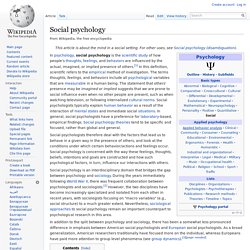
Social psychology is concerned with the way these feelings, thoughts, beliefs, intentions and goals are constructed and how such psychological factors, in turn, influence our interactions with others. In addition to the split between psychology and sociology, there has been a somewhat less pronounced difference in emphasis between American social psychologists and European social psychologists. As a broad generalization, American researchers traditionally have focused more on the individual, whereas Europeans have paid more attention to group level phenomena (see group dynamics).[3][page needed] History[edit] Intrapersonal phenomena[edit] Attitudes[edit] Persuasion[edit] The topic of persuasion has received a great deal of attention in recent years. Social cognition[edit] Self-concept[edit] Home. Social Psychology Network. Sociology of Race and Ethnicity. By Ashley Crossman Race and ethnicity are important concepts in the field of sociology and are ones that are studied a great deal.

OpenStax CNX. Sociological Theories of Prejudice and Racism. Theories of Education. Historically, American education served both political and economic needs, which dictated the function of education.

Today, sociologists and educators debate the function of education. Three main theories represent their views: the functionalist theory, the conflict theory, and the symbolic interactionist theory. The functionalist theory The functionalist theory focuses on the ways that universal education serves the needs of society. Functionalists first see education in its manifest role: conveying basic knowledge and skills to the next generation. Functionalists point to other latent roles of education such as transmission of core values and social control. Giddens 7th Edition. Racial segregation underpinned the apartheid system in South Africa.
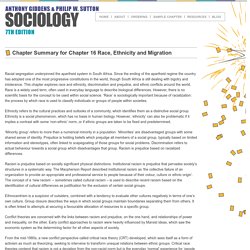
Since the ending of the apartheid regime the country has adopted one of the most progressive constitutions in the world, though South Africa is still dealing with bigotry and intolerance. This chapter explores race and ethnicity, discrimination and prejudice, and ethnic conflicts around the world. Race is a widely used term, often used in everyday language to describe biological differences. However, there is no scientific basis for the concept to be used within social science. ‘Race’ is sociologically important because of racialization: the process by which race is used to classify individuals or groups of people within societies. Ethnicity refers to the cultural practices and outlooks of a community, which identifies them as a distinctive social group.
‘Minority group’ refers to more than a numerical minority in a population. Racism is prejudice based on socially significant physical distinctions. Diversity, social interaction and solidarity. For many reasons, society is becoming more diverse in terms of culture, religion, gender-norms and lifestyle.

Increased diversity will have an impact on social interaction and the integration of societies. Diversity is a political concern but, as yet, decision-making does not rest on a sufficient, sound basis of knowledge. Society is becoming more diverse owing to, among other factors, increased cross-border mobility, less-rigid gender roles, improved living standards and individualization processes. The diversity of lifestyles, value systems and experiences has consequences for social interaction, and the self-conception and internal integration of societies1; however, its precise impact is in many ways unclear. Intensified research is urgently needed as the effects of diversity are often the subject of controversial political debates. Australian citizenship. Functionalism. Functionalism is a theory about the nature of mental states.
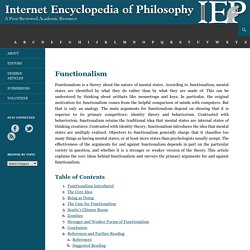
According to functionalism, mental states are identified by what they do rather than by what they are made of. This can be understood by thinking about artifacts like mousetraps and keys. In particular, the original motivation for functionalism comes from the helpful comparison of minds with computers. But that is only an analogy. The main arguments for functionalism depend on showing that it is superior to its primary competitors: identity theory and behaviorism.
Table of Contents 1. Functionalism is a theory about the nature of mental states. 2. Interactionism. Conflict theory. In sociology, conflict theory states that society or an organization functions so that each individual participant and its groups struggle to maximize their benefits, which inevitably contributes to social change such as political changes and revolutions.
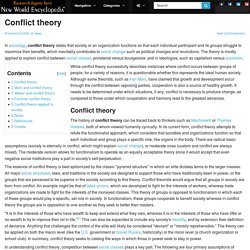
Functionalism (philosophy of mind) Since mental states are identified by a functional role, they are said to be realized on multiple levels; in other words, they are able to be manifested in various systems, even perhaps computers, so long as the system performs the appropriate functions.

While computers are physical devices with electronic substrate that perform computations on inputs to give outputs, so brains are physical devices with neural substrate that perform computations on inputs which produce behaviors. An important part of some accounts of functionalism is the idea of multiple realizability. Since, according to standard functionalist theories, mental states are the corresponding functional role, mental states can be sufficiently explained without taking into account the underlying physical medium (e.g. the brain, neurons, etc.) that realizes such states; one need only take into account the higher-level functions in the cognitive system. Understanding Conflict Theory. By Ashley Crossman Updated February 17, 2016.
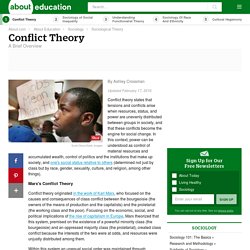
Conflict theory states that tensions and conflicts arise when resources, status, and power are unevenly distributed between groups in society, and that these conflicts become the engine for social change. In this context, power can be understood as control of material resources and accumulated wealth, control of politics and the institutions that make up society, and one's social status relative to others (determined not just by class but by race, gender, sexuality, culture, and religion, among other things). Marx's Conflict Theory. ViewContent?readform&view=productsbyCatalogue&Action=Expand&Num=3. A-level Sociology Revision. The Interactionist Perspective. The Functionalist Perspective.